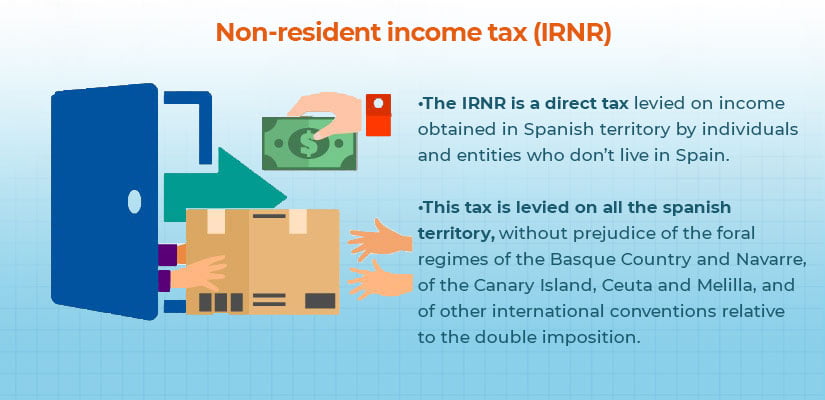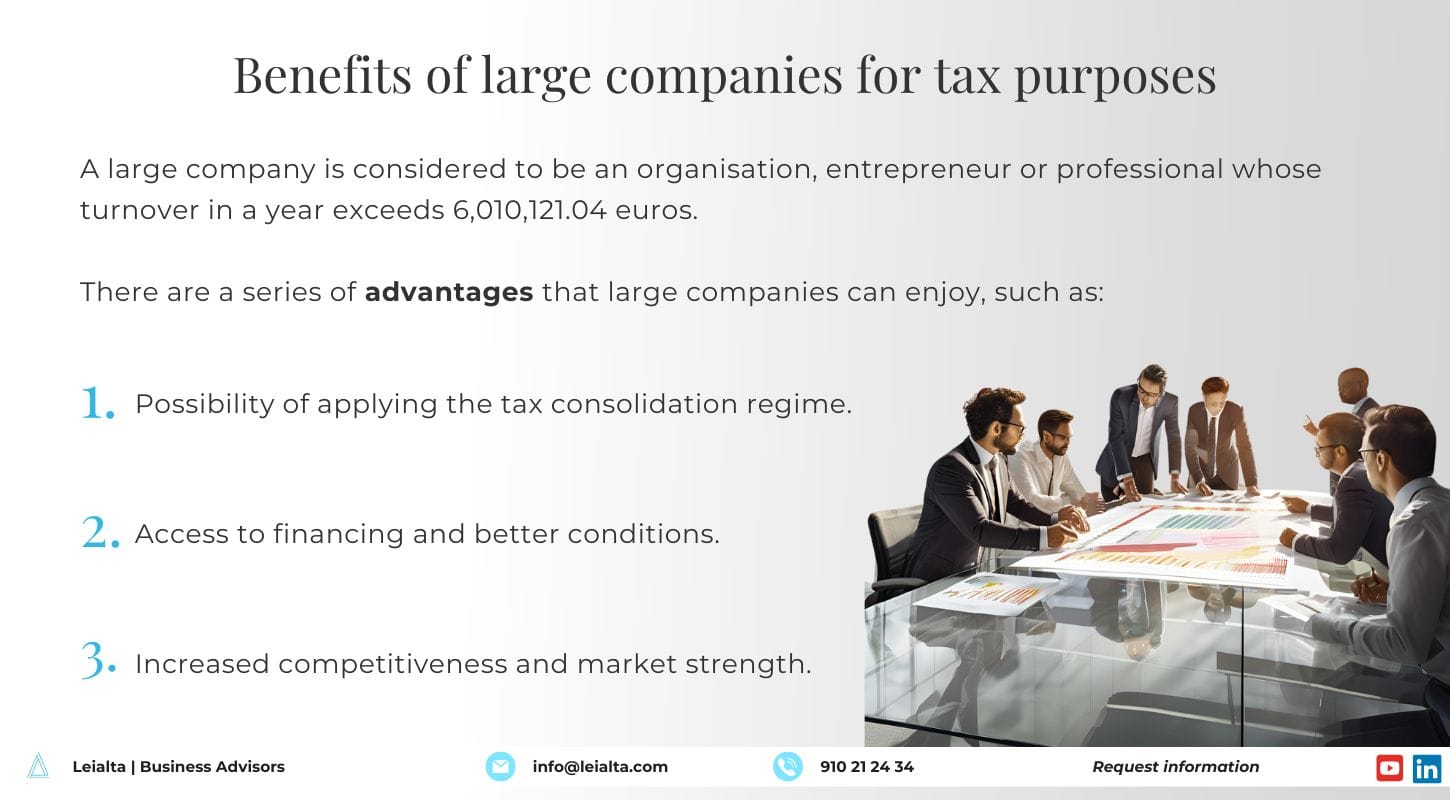
Do you want to start a company in Spain but you don’t know the tax legislation? Do you need a tax representative to help you out? The Non-Resident Income Tax is one of the taxes that should be analyzed in order to know whether you’ll have to pay or not.
Commercial transactions between individuals or companies from different countries are currently very frequent, which is why the Non-Resident Income Tax (IRNR in Spanish) has been created in Spain to control the incomes earned in our country.
The IRNR is a direct tax on the income obtained in Spanish territory by individuals and entities who don’t live in Spain.
This tax is levied on all the territory of Spain, without prejudice of the foral regimes of the Basque Country and Navarre, of the Canary Island, Ceuta and Melilla, and of other international conventions relative to the double imposition that has been signed among Spain and other countries.
Who pays the Non-Resident Income Tax (IRNR)?
Index of contents
The law regulating the IRNR establishes that the taxpayers for this tax are the following:
- Individuals or entities that do not live in Spain but make profits in our country, unless they are taxed for the IRNR.
- Individuals from other countries who live in Spain due to their position or job, such as members of diplomatic missions, consular offices or active civil servants working in Spain.
- Entities who have to pay taxes, which have been created abroad but have presence in Spain.
- The residence in Spain is established according to the IRPF law and Corporate Income Tax (IS), which means that if a person or an entity is not considered an IRPF or IS taxpayer, he/she may be an IRNR taxpayer.
Why must the IRNR be paid?
Now that you know what the IRNR is and who must pay it, it is time to examine why it must be paid: the chargeable event.
The IRNR chargeable event, that is, what is taxed, is the obtaining of income, in cash or in goods, by the taxpayers in Spanish territory.
The incomes that are considered to be earned in Spain are the following:
- The profits made from economic activities or operations carried out by an establishment permanently located in Spain.
- The profits made from economic activities or operations carried out without an establishment permanently located in Spain when:
- The economic activity is carried out in Spain.
- It’s about services used in Spain
- The income comes from the performance in Spain of artists and athletes
- It’s about the profits made from activities developed in Spain, remunerations from the Public Administration or incomes earned by individuals who carry out economic activities on board a ship or an aircraft.
- Pensions and similar benefits
- Remuneration to directors or members of the board of directors of an entity resident in Spain.
- Certain income from real estate capital.
- Income that comes from real estate located in Spain.
- Income attributed to individuals who own urban real estate located in Spain.
- Capital gains when they come from, for example, securities issued by individuals or entities resident in Spain.
In addition to the above, we must consider that there is exempt income such as scholarships received by individuals.
Why is a fiscal representative necessary?
The IRNR taxpayer resides outside Spain, which makes it difficult for the Spanish Tax Agency to have control over the tax payments. Therefore, IRNR taxpayers must appoint a tax representative who can be an individual or a legal entity (company), and who must reside in Spain.
The tax representative must represent the taxpayer in several cases:
- When acting in Spanish territory through a permanent establishment.
- When they carry out activities in Spain without a permanent establishment.
- When they are entities under the income attribution regime that have been formed abroad and carry out economic activity.
- When it is established by the tax administration.
- In the case of countries where there is no exchange of tax information.
From the moment you appoint your tax representative in Spain, you will have a period of two months to communicate it to the Tax Administration.
When and how must the IRNR be filed?
The deadline for filing the tax will depend on the type of income to be declared:
- Income coming from the transfer of real estate: 3 months after one month has passed since the transfer.
- Income derived from urban real estate: the calendar year following the date of accrual (December 31 of each year).
- Rest of the profits:
- Self-assessment to be paid: first 20 calendar days of the months of April, July, October and January, for income accrued in the previous quarter.
- Self-assessments with a result of zero: January 1st to January 20th of the year following that in which the income accrued.
- Self-assessment to be refunded: to be filed from February 1st of the year following that in which the income accrued and within a maximum period of 4 years.
Filing is done electronically or in paper format through the models 210, 211, 213, 216 and 247, once the Tax Agency form has been completed on the Internet.
How can LEIALTA help you if you want to start a company in Spain?
If you have decided to invest in Spain and create a company, you will need to hire a business advisory service in Spain to help you with the paperwork and to guide you in complying with the tax and legal obligations in the country.
In order to help you with the management, we offer several services:
- An analysis of the most favorable regulations for your future company in Spain from a labor, tax or commercial point of view, among others, prior to the constitution of the company.
- Legal and tax representation. As we have seen, the Spanish Tax Agency, for its control, requires the appointment of a fiscal representative. In addition, you can give that representative legal powers. With our service of legal and fiscal representation you can:
- Start your business in Spain and carry out all the necessary formalities
- Buy and sell in our country
- Have an interlocutor with the Spanish Tax Administration.
- Benefit from a team of experts in various disciplines with whom you will be able to carry out all the procedures in English.
- Cash Handling service.
If you find it difficult to open a bank account in Spain, we can do it for you so that you are able to collect and pay suppliers, pay taxes, salaries to workers and the Social Security costs. We will simply put an account at your disposal, agree a payment schedule with your company, inform you about the amounts to be paid and make the payments in a legal and transparent way.
As you have seen, investing in Spain is easy if you have the help of experts who know the Spanish legislation in depth and who can advise you if you have any doubts. Do you need advice for your case? Do not hesitate to contact us.




Hello Paul, Can the country in which dividends are paid to me tax me at a higher rate simply because I receive them in another country? Best Regards
Dear Thommas, No. The European principle of equal treatment also applies to taxation of dividends, interest and other income from securities. The country from which the dividends are paid cannot apply a higher tax rate simply because they are transferred to another country… unless your country of residence applies a reduction to compensate for the higher tax to avoid discriminating against you. Best Regards.